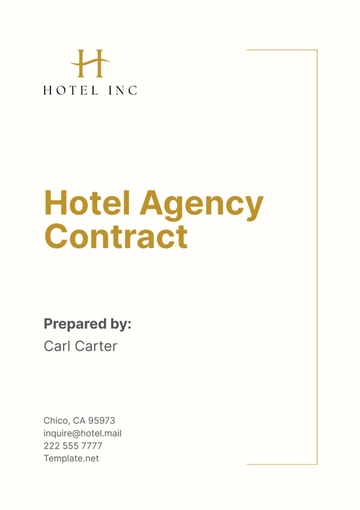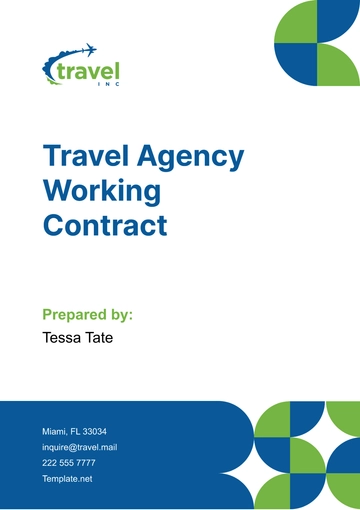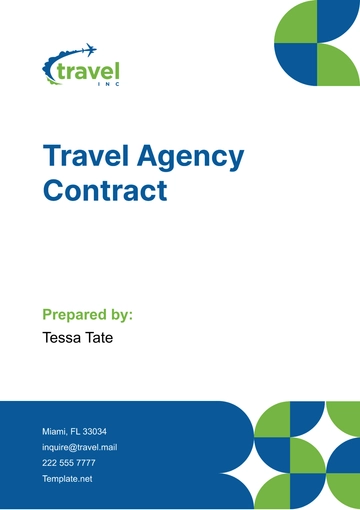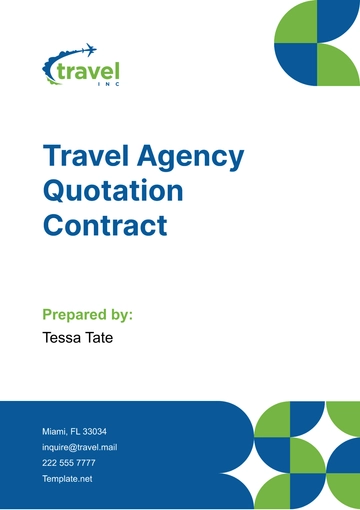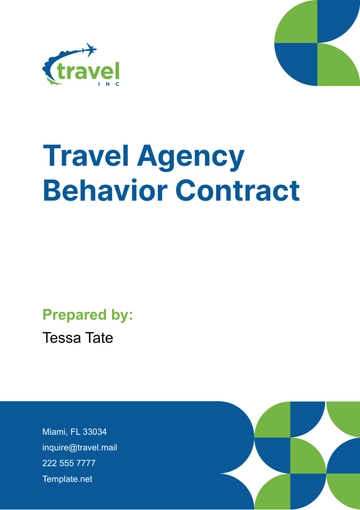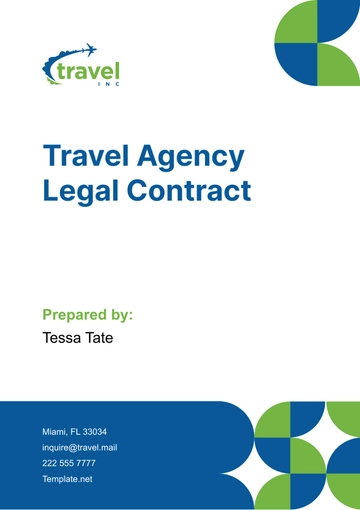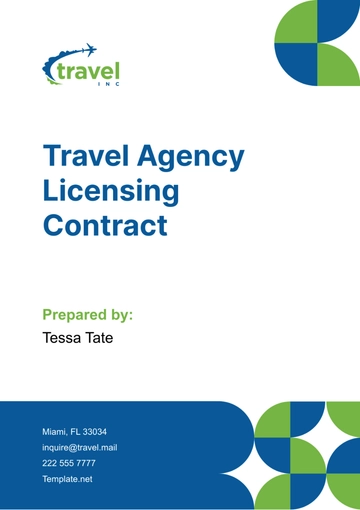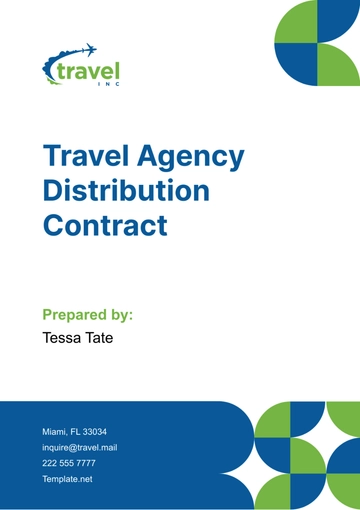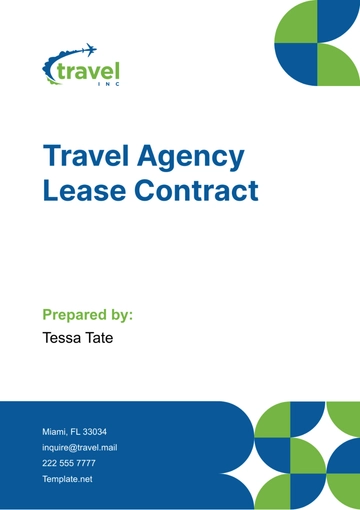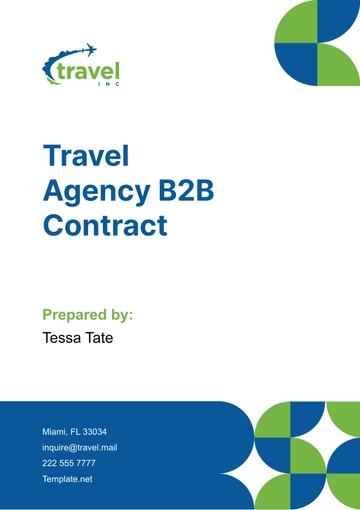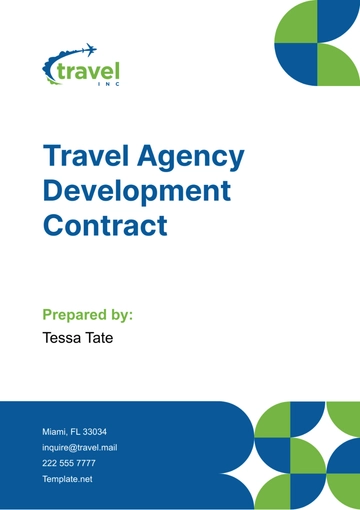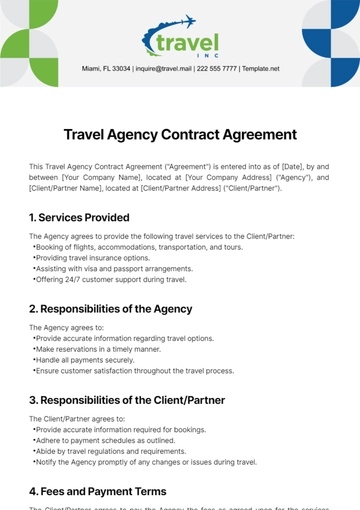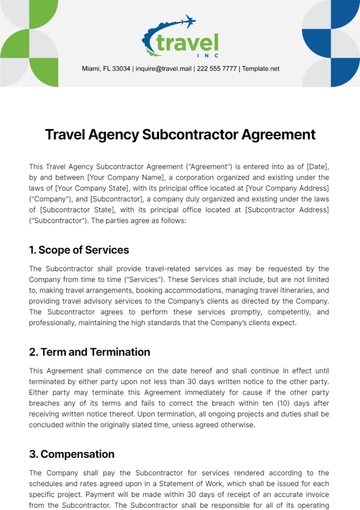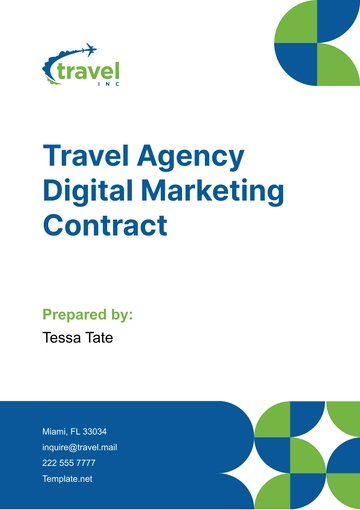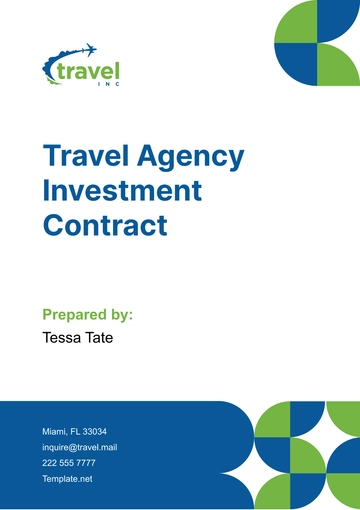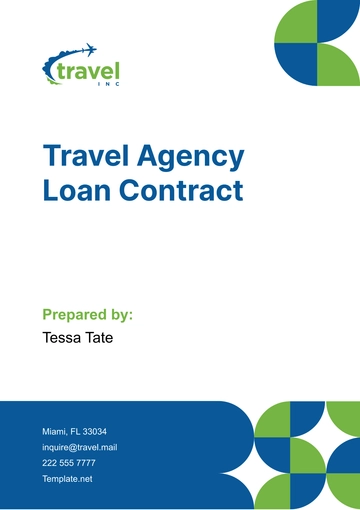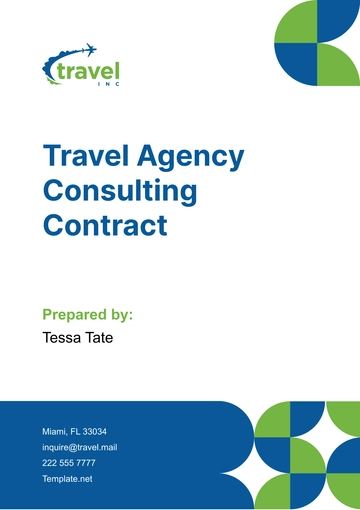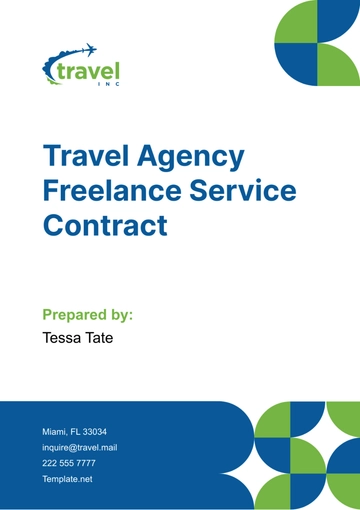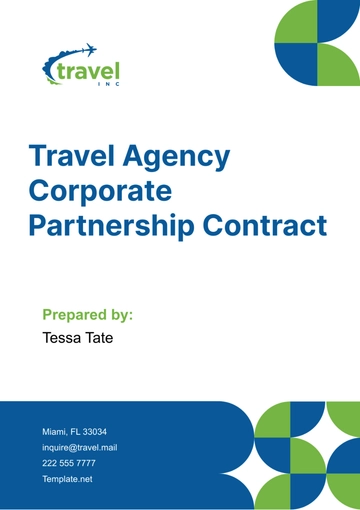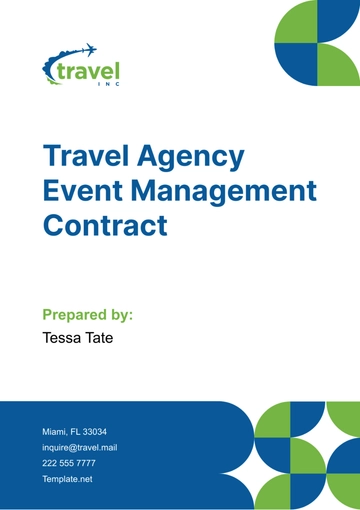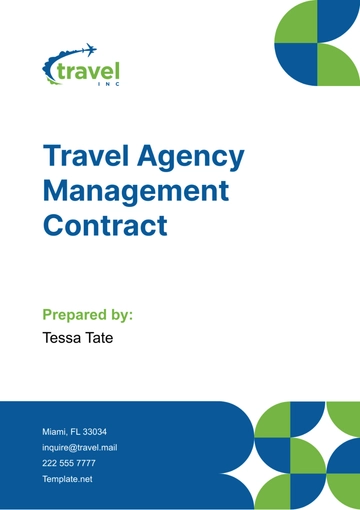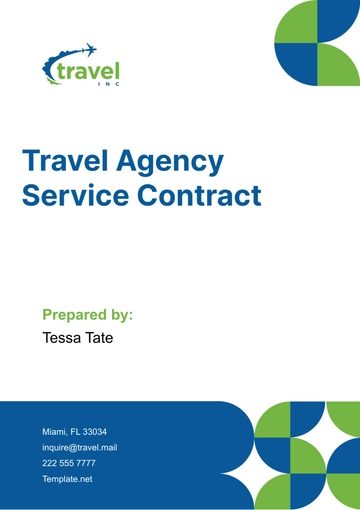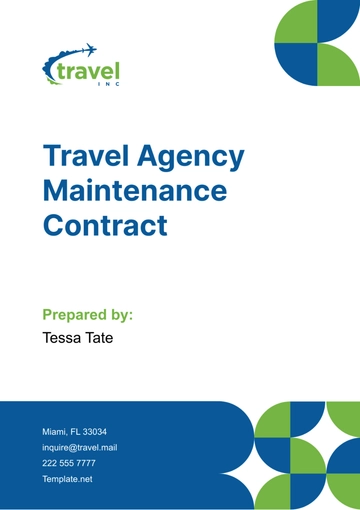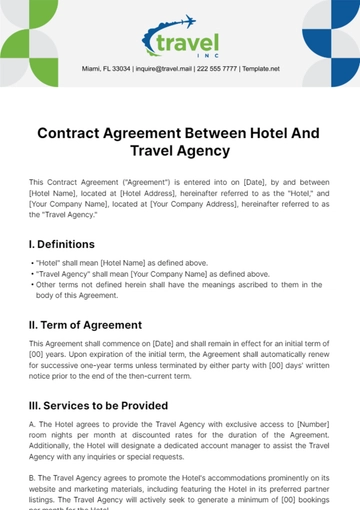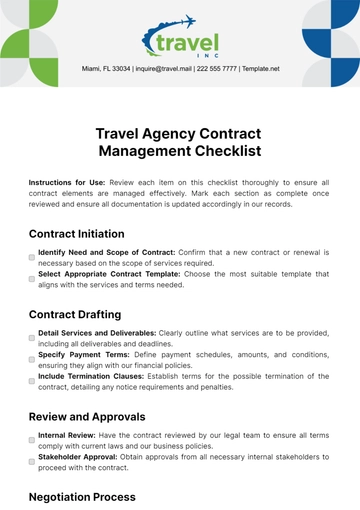Free Travel Agency Contract
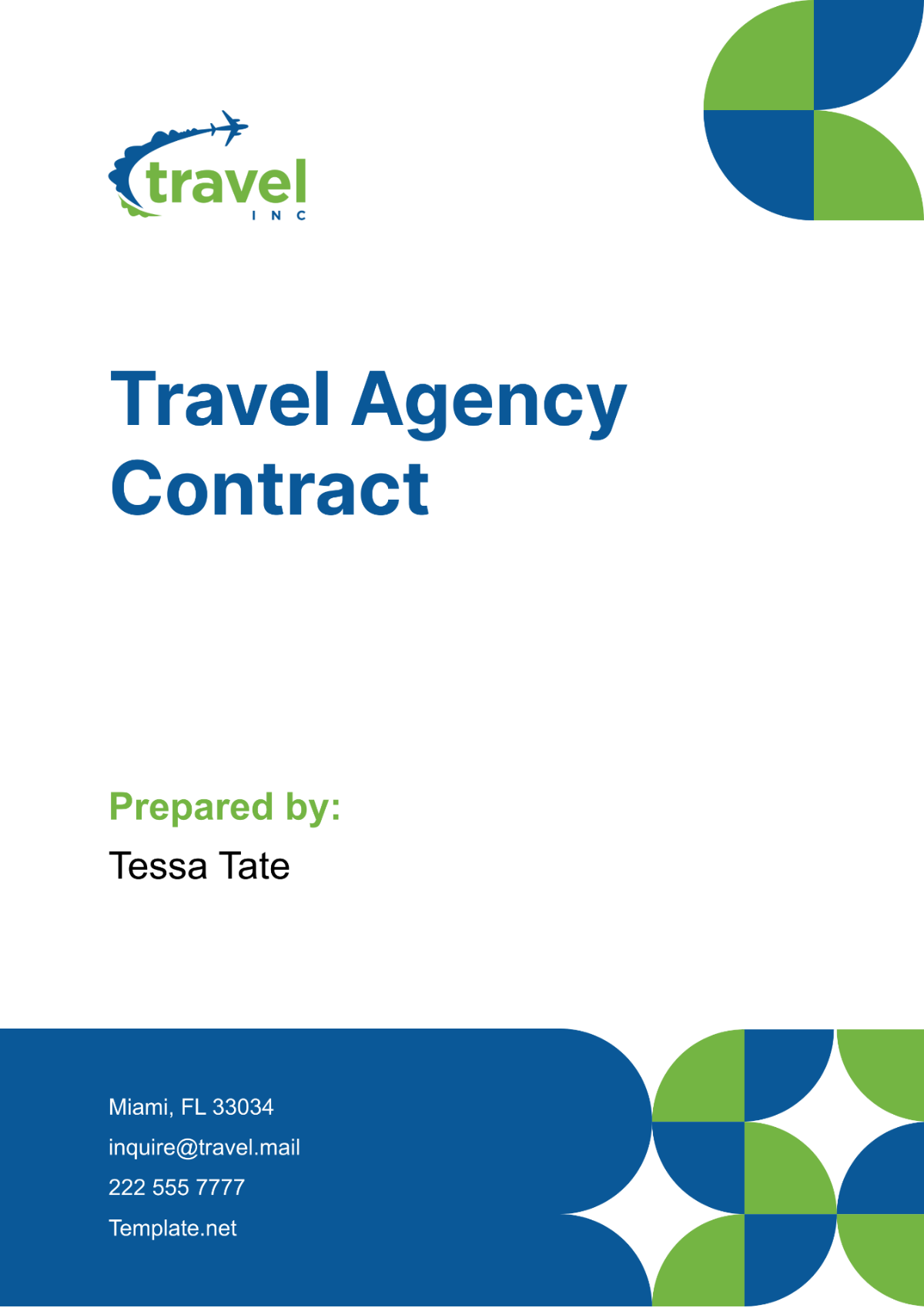
I. The Parties
This Travel Agency Contract (the “Contract”) is entered into as of [Month Day, Year] (the "Effective Date"), by and between [Your Company Name], a company incorporated and existing under the laws of [State Name] with a principal place of business at [Your Company Address] (the "Agency"), and [Client's Name] with a principal place of business at [Client's Address] (the "Client") collectively referred to as (the "Parties").
WHEREAS, the Agency is a professional travel agency that provides comprehensive travel and tourism services;
WHEREAS, the Client is in need of such services and wishes to engage the Agency to provide such services under the terms and conditions set forth in this Contract;
WHEREAS, the Agency agrees to provide such services to the Client, subject to the terms and conditions set forth in this Contract;
NOW, THEREFORE, in consideration of the mutual covenants contained herein and for other good and valuable consideration, the receipt and sufficiency of which is hereby acknowledged, the Parties agree as follows:
II. Services Rendered
The Agency hereby agrees to provide comprehensive travel management services to the Client. These services include, but are not limited to:
A. Transportation Arrangements
Air Travel: The Agency will handle all aspects of air travel. This includes booking flights that align with the Client’s schedule and preferences, ensuring timely check-ins to avoid any travel disruptions, and managing any changes or cancellations that may arise during the course of travel.
Ground Transportation: The Agency will arrange for ground transportation as needed for the Client’s travel itinerary. This could include taxis, shuttles, or rental cars, depending on the Client’s preferences and the nature of the travel itinerary.
Seamless Coordination: The Agency will ensure seamless coordination between different modes of transport to provide a smooth and hassle-free travel experience for the Client.
B. Accommodation Services
Lodging Accommodations: The Agency will secure comfortable and convenient lodging accommodations that meet the Client’s preferences and budget. The Agency will consider factors such as location, amenities, and cost while selecting accommodations.
Venue Booking: If the Client’s travel involves attending events or meetings, the Agency will handle booking venues as required. The Agency will ensure that the venues align with the Client’s requirements and preferences.
Alternative Accommodations: In case of unavailability of preferred accommodations or venues, the Agency will provide suitable alternatives that closely match the Client’s requirements.
C. Event Management Services
Event Planning: The Agency will assist in planning and managing events that the Client will be attending or hosting during their travel. This includes coordinating with event organizers, managing event schedules, and ensuring that all necessary arrangements are in place.
On-site Support: The Agency will provide on-site support during events to ensure everything runs smoothly. This includes handling any last-minute changes or issues that may arise.
Post-Event Services: After the conclusion of events, the Agency will handle post-event services such as feedback collection, settlement of bills, and any other necessary follow-ups.
III. Responsibilities of the Agency
The Agency shall:
A. Negotiation of Rates and Terms
Best Efforts: The Agency will use its best efforts to negotiate favorable rates and terms on behalf of the Client, aiming to provide the most cost-effective travel solutions.
Transparency: The Agency will maintain transparency with the Client about all costs and will not add any hidden charges.
Value for Money: The Agency will strive to ensure that the Client receives the best value for their money in all services provided.
B. Communication and Updates
Regular Updates: The Agency will keep the Client informed of any changes affecting the planned travel itineraries. This includes updates on flight schedules, accommodation bookings, event schedules, and any other relevant information.
Prompt Communication: The Agency will promptly communicate any issues or challenges that may affect the provision of services. The Agency will work closely with the Client to resolve such issues in a timely manner.
Feedback: The Agency will regularly seek feedback from the Client on the services provided. This will help the Agency to continuously improve its services and cater to the Client’s needs more effectively.
IV. Responsibilities of the Client
The Client shall:
A. Information Provision
Complete Information: The Client is responsible for providing the Agency with complete and accurate information required for booking travel services. This includes personal details such as full name, date of birth, passport details, and contact information. It also includes travel preferences such as preferred airlines, meal preferences, seating preferences, and any special needs or requirements.
Timely Updates: If there are any changes to the provided information that may affect the travel arrangements, the Client is responsible for promptly updating the Agency. This could include changes in travel dates, destinations, accommodation preferences, or any other aspect of the travel arrangements.
Verification: The Client is responsible for verifying the accuracy of all travel documents and itineraries provided by the Agency before travel. This includes checking the dates, times, locations, and other details on flight tickets, hotel bookings, event tickets, and other travel documents. Any discrepancies should be reported to the Agency immediately for rectification.
B. Payments
Prompt Payments: The Client is responsible for making prompt payments as detailed in the Payment Terms section of this Contract. Delayed payments may result in disruptions to the travel arrangements, such as cancellation of bookings or imposition of late fees. Therefore, the Client should ensure that all payments are made by the due dates specified in the Contract.
Payment Method: The Client is responsible for making payments using the method specified in the Contract. This could be through bank transfer, credit card, check, or any other method specified by the Agency. Any charges or fees associated with the payment, such as bank transfer fees or credit card charges, shall be borne by the Client.
Disputes: If the Client has any disputes regarding the payments, they should notify the Agency in writing within a specified period after receiving the invoice. The Agency and the Client will then work together to resolve the dispute in a fair and amicable manner.
C. Communication
Changes or Cancellations: If the Client needs to make any changes or cancellations to the travel arrangements, they should notify the Agency in a timely manner. This will enable the Agency to make necessary adjustments to the travel arrangements and minimize any potential cancellation fees or penalties.
Feedback: The Client is encouraged to provide feedback to the Agency regarding the travel services. This could include feedback on the quality of the services, the responsiveness of the Agency, or any other aspect of the travel experience. Such feedback is valuable for the Agency as it helps to improve its services and cater to the Client’s needs more effectively.
V. Fees and Payment Terms
The Client agrees to pay the Agency fees for the travel services rendered according to the following payment schedule:
A. Deposit
Upon Contract Signing: Upon signing the Contract, the Client is required to pay a deposit of [30]% of the total cost of the travel services. This initial deposit secures the Agency’s services and allows the Agency to start making travel arrangements.
Commitment: The deposit also serves as a commitment from the Client that they intend to utilize the Agency’s services.
Non-Refundable: Unless otherwise specified in the Contract, the deposit is typically non-refundable. This is to compensate the Agency for the time and resources spent on making the initial travel arrangements.
B. Balance Payment
Remaining Balance: The remaining balance of the total cost of the travel services is to be paid on or before a specified date [Month Day, Year]. This ensures that all services are fully paid for before the start of the travel.
Payment Reminder: The Agency will send a reminder to the Client before the due date for the balance payment. This is to ensure that the Client remembers to make the payment on time.
Late Payment Consequences: If the balance payment is not made by the due date, the Agency may charge a late fee as specified in the Contract. In some cases, late payment may also result in cancellation of the travel arrangements.
C. Payment Method
Currency: All payments shall be made in [USD] to the designated account provided by the Agency. This ensures consistency and avoids confusion due to currency exchange rates.
Payment Methods: The Client can make payments through various methods such as bank transfer, credit card, or check, as specified in the Contract. The Client should choose a payment method that is convenient and cost-effective for them.
Transaction Charges: Any transaction charges or fees associated with the payment, such as bank transfer fees or credit card charges, shall be borne by the Client. The Client should take these charges into account when making payments.
Receipt: Upon receiving the payment, the Agency will provide a receipt to the Client. The receipt serves as proof of payment and may be required for future reference or for claiming reimbursements.
VI. Term and Termination
A. Notice of Termination
Early Termination: Either party may terminate this Contract earlier by giving not less than [30] days written notice to the other party. This allows for sufficient time for both parties to wrap up any ongoing tasks and settle any outstanding payments.
Notice Requirements: The notice of termination must be in writing and must clearly state the reasons for termination. This ensures transparency and allows the other party to address any issues, if possible.
Receipt of Notice: The notice period begins from the date the notice is received by the other party. It is recommended to send the notice via a method that provides proof of delivery, such as registered mail or email with read receipt.
B. Termination for Cause
Breach of Contract: If either party breaches any terms of this Contract, the other party has the right to terminate the Contract immediately. The party alleging the breach must provide evidence of the breach.
Remedy Period: Upon receiving notice of a breach, the breaching party will have a specified period [14] days to remedy the breach. If the breach is not remedied within this period, the Contract may be terminated immediately.
Effects of Termination: Upon termination, all obligations under this Contract will become due immediately. This includes any unpaid fees or charges.
C. Termination without Cause
Mutual Agreement: The Parties may mutually agree to terminate this Contract at any time without cause. Such termination must be in writing and signed by both Parties.
Notice Period: A notice period [30] days may still apply for termination without cause to allow both Parties to wrap up any ongoing tasks.
Settlement of Accounts: Upon termination without cause, the Parties shall settle all accounts, including payment for services rendered up to the date of termination and any other amounts due under the terms of this Contract.
VII. Confidentiality
Both parties agree:
A. Non-Disclosure
Confidential Information: Both parties agree not to disclose any confidential information obtained during the term of this Contract to any third party. Confidential information includes, but is not limited to, business strategies, customer lists, marketing plans, and any other information that is not publicly available.
Exceptions: Confidential information may be disclosed if required by law or with the prior written consent of the other party. The party intending to disclose confidential information must notify the other party in advance and must limit the disclosure to the minimum necessary.
Obligations: The obligations to protect confidential information apply during the term of the Contract and for a specified period [2] years after the termination of the Contract.
B. Protection of Confidential Information
Security Measures: Both parties must implement reasonable security measures to protect the confidential information from unauthorized access, use, disclosure, alteration, or destruction.
Unauthorized Disclosure: If a party becomes aware of any unauthorized disclosure of confidential information, it must promptly notify the other party and cooperate with any efforts to minimize the impact of the disclosure.
Return or Destruction: Upon termination of the Contract, each party must return or destroy all confidential information of the other party, unless otherwise agreed in writing.
C. Legal Compliance
Lawful Use: Both parties agree to use the confidential information only for lawful purposes and in accordance with the terms of this Contract.
Regulatory Requirements: If a party is required by law, regulation, or a valid binding order of a court or other governmental body to disclose confidential information, it must promptly notify the other party and cooperate with any efforts to seek a protective order or other appropriate remedy.
Indemnification: Each party agrees to indemnify the other party against any losses, damages, or expenses incurred as a result of unauthorized use or disclosure of confidential information.
Data Protection: Both parties must comply with all applicable data protection and privacy laws and regulations in relation to the processing of confidential information. This includes obtaining necessary consents, providing required notices, and implementing appropriate security measures.
Confidentiality Agreement: If required, the parties may enter into a separate confidentiality agreement that provides more detailed provisions on the handling of confidential information. This Contract and the confidentiality agreement should be read together and in the event of any conflict, the terms of the confidentiality agreement shall prevail.
VIII. Liability
The Agency’s liability in relation to this Contract is as follows:
A. Limitation of Liability
Indirect Damages: The Agency will not be liable for any indirect damages arising out of this Contract. Indirect damages refer to those damages that are not a direct result of a breach of this Contract, but are a consequence of such breach.
Special Damages: The Agency will not be liable for any special damages arising out of this Contract. Special damages are those damages that are not a usual consequence of a breach of contract, but occur due to some special circumstances.
Consequential Damages: The Agency will not be liable for any consequential damages arising out of this Contract. Consequential damages are those damages that are a result of a chain of events triggered by a breach of contract.
B. Specific Exclusions
Third-Party Claims: The Agency will not be liable for any claims made by third parties arising out of this Contract. This includes, but is not limited to, claims made by service providers, other travelers, or any other third parties.
Flight Cancellations: The Agency will not be liable for losses due to flight cancellations. While the Agency will make every effort to assist the Client in such situations, any refunds or compensation will be subject to the terms and conditions of the airline.
Accommodations and Other Services: The Agency will not be liable for losses related to accommodations or other services related to the travel arrangements. This includes, but is not limited to, hotel bookings, car rentals, event tickets, and tour packages.
IX. Governing Law
This Contract shall be governed by and construed in accordance with the following:
A. Applicable Law
State Law: This Contract shall be governed by and construed in accordance with the laws of [State Name]. This means that any disputes arising out of this Contract will be resolved under the laws of [State Name], regardless of where the Client or the Agency is located.
Federal Law: If any provision of this Contract is governed by federal law, then such provision will be interpreted and enforced under the relevant federal law.
B. Jurisdiction
Court Jurisdiction: Any disputes arising out of this Contract will be subject to the jurisdiction of the courts located within [State Name]. This means that any legal proceedings related to such disputes must be initiated in these courts.
Alternative Dispute Resolution: If the Parties agree to resolve their disputes through alternative dispute resolution methods, such as mediation or arbitration, then the rules of the agreed-upon method will apply.
C. Compliance
Legal Compliance: Both Parties agree to comply with all applicable laws and regulations in the performance of this Contract. This includes, but is not limited to, laws related to business operations, travel services, consumer protection, and data protection.
Licenses and Permits: The Agency represents and warrants that it has all necessary licenses and permits to provide the travel services under this Contract.
Ethical Practices: Both Parties agree to conduct their business in an ethical manner. This includes, but is not limited to, avoiding conflicts of interest, not engaging in any form of corruption or bribery, and treating each other with respect and fairness.
X. Dispute Resolution
Any disputes arising out of this Contract shall be resolved as follows:
A. Mediation
Initial Step: The initial step in dispute resolution is mediation. Both parties agree to participate in good faith in the mediation process. This involves a neutral third party (the mediator) who facilitates discussions between the parties to help them reach a mutually acceptable solution.
Selection of Mediator: The parties will mutually agree on the selection of the mediator. If the parties cannot agree on a mediator, one will be appointed by the [Arbitration Institution Name].
Mediation Process: The mediator will set the rules for the mediation process. Both parties agree to abide by these rules and to participate actively in the mediation process.
B. Arbitration
If Mediation Fails: If the parties are unable to resolve their dispute through mediation, then the dispute will be resolved through final and binding arbitration under the rules of arbitration of [Arbitration Institution Name].
Selection of Arbitrator: The parties will mutually agree on the selection of the arbitrator. If the parties cannot agree on an arbitrator, one will be appointed by the [Arbitration Institution Name].
Arbitration Process: The arbitrator will set the rules for the arbitration process. Both parties agree to abide by these rules and to participate actively in the arbitration process.
XI. Entire Agreement
A. Supersession of Prior Agreements
Entire Agreement: This Contract constitutes the entire agreement between the parties. It supersedes all prior agreements, understandings, negotiations, and discussions, whether written or oral, between the parties.
No Reliance on Prior Agreements: Each party acknowledges that, in entering into this Contract, it does not rely on any statement, representation, assurance, or warranty of any person other than as expressly set out in this Contract.
B. Amendments
Written Amendments: Any amendments to this Contract must be in writing and signed by both parties. This ensures that both parties agree to the changes and that the changes are properly documented.
Effect of Amendments: Any amendments to this Contract will become effective from the date specified in the amendment. If no date is specified, the amendment will become effective from the date it is signed by both parties.
Notification of Amendments: Each party agrees to notify the other party in writing of any proposed amendments to this Contract. The other party will have a specified period [14] days to review and respond to the proposed amendments.
XII. Signatures
The parties to this Contract have executed it on the day and year first above written.
Agency

[Authorized Representative Name]
[Your Company Name]
Date: [Month Day, Year]
Client

[Client's Name]
Date: [Month Day, Year]
- 100% Customizable, free editor
- Access 1 Million+ Templates, photo’s & graphics
- Download or share as a template
- Click and replace photos, graphics, text, backgrounds
- Resize, crop, AI write & more
- Access advanced editor
Formalize agreements and transactions with this editable Travel Agency Contract Template from Template.net! This versatile resource provides a standardized format for creating legally binding contracts between your agency and clients, partners, suppliers, or service providers. Utilize our AI Editor Tool and customizable features to tailor the contract to your needs!
You may also like
- Rental Contract
- Contractor Contract
- Contract Agreement
- One Page Contract
- School Contract
- Social Media Contract
- Service Contract
- Business Contract
- Restaurant Contract
- Marketing Contract
- Real Estate Contract
- IT Contract
- Cleaning Contract
- Property Contract
- Supplier Contract
- Partnership Contract
- Food Business Contract
- Construction Contract
- Employment Contract
- Investment Contract
- Project Contract
- Payment Contract
- Student Contract
- Travel Agency Contract
- Startup Contract
- Annual Maintenance Contract
- Employee Contract
- Gym Contract
- Event Planning Contract
- Personal Contract
- Nursing Home Contract
- Law Firm Contract
- Work from Home Contract
- Software Development Contract
- Maintenance Contract
- Music Contract
- Amendment Contract
- Band Contract
- DJ Contract
- University Contract
- Salon Contract
- Renovation Contract
- Photography Contract
- Lawn Care Contract

